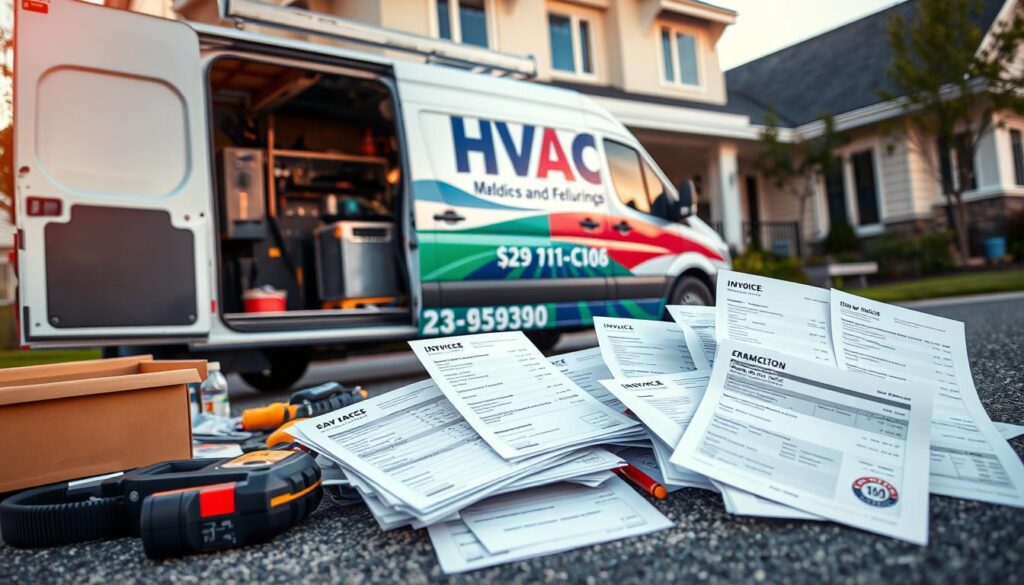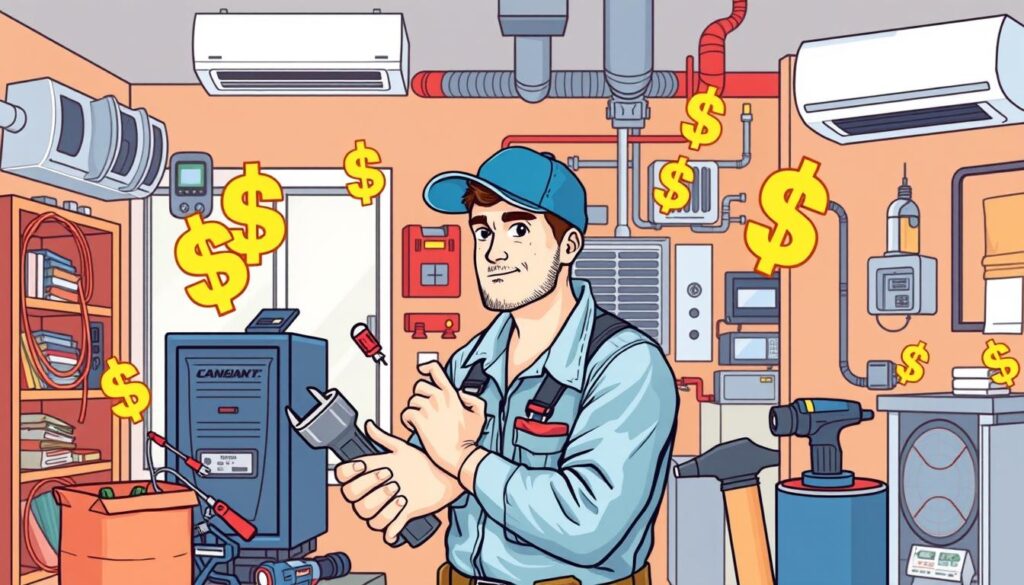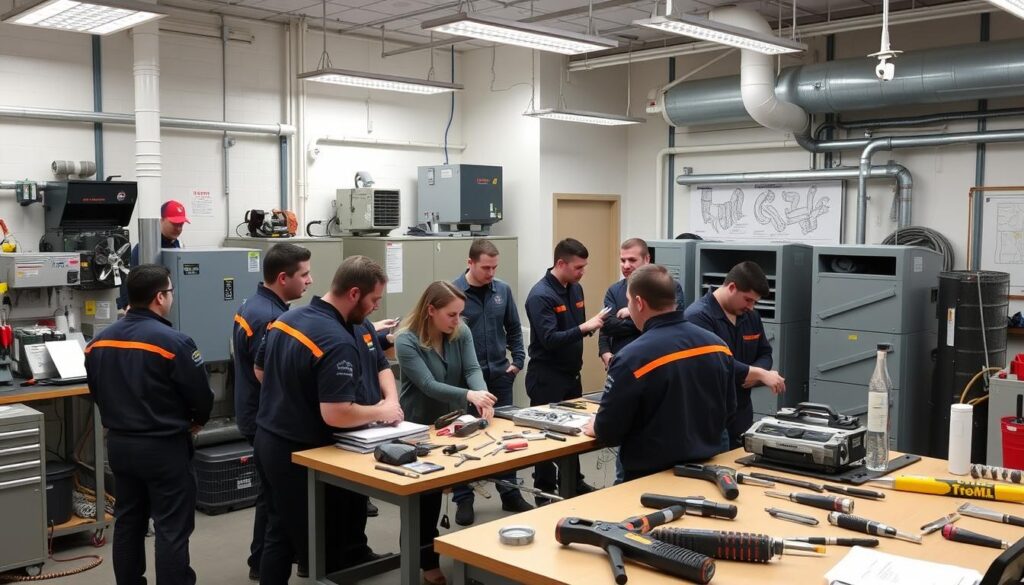Affiliate Disclosure
HVAC Guide Guys is a participant in the Amazon Services LLC Associates Program, an affiliate advertising program designed to provide a means for sites to earn advertising fees by advertising and linking to Amazon.
Do HVAC Techs Get Paid Commission? As an HVAC technician, how you get paid matters a lot. It affects your earnings, job happiness, and the company’s success. Knowing about different pay models is key. Your salary is how you support yourself and your family.
In this article, we’ll look into HVAC technician pay. We’ll talk about the good and bad of commission-based pay. We’ll also cover industry standards and how performance-based bonuses can shape your career. By the end, you’ll know more about the different pay structures and what they mean for you.

Key Takeaways
- Commission-based compensation is a common pay model for HVAC technicians, alongside hourly and salary options.
- A mixed approach that combines hourly pay with commission opportunities can help prevent competition among team members.
- Rewarding technicians for selling additional services can boost revenue for the HVAC business.
- Commission-based pay can motivate technicians to perform high-quality work and improve their skills.
- Budgeting becomes more straightforward when labor costs are fixed through commission-based pay structures.
Table of Contents
Understanding HVAC Technician Compensation Models
In the HVAC industry, technicians get paid in different ways. Two main models are base salary and commission-based pay. Each has its own benefits and things to think about.
Base Salary vs. Commission Structure
HVAC technicians with a base salary get a set amount of money every month. This makes their income steady and easy to predict. On the other hand, those on a commission-based pay get more money if they sell more services or fix more problems.
Industry Standards for HVAC Pay
The average HVAC technician in the U.S. makes $57,018 a year, or $28.45 an hour. New technicians start with about $34,775 a year. Experienced ones in areas like commercial HVAC can earn between $56,843 and $71,827 or $49,049 and $66,407.
Performance-Based Incentives
- Some HVAC companies give bonuses for selling more maintenance agreements or certain products.
- These bonuses can add to a technician’s base salary, giving them more to earn.
- But, focusing too much on making more money can make technicians overlook important repairs or maintenance.
The way HVAC companies pay their technicians can really affect the service quality and technician happiness. It also affects how long they stay with the company.
Do HVAC Techs Get Paid Commission?
Many HVAC companies pay their technicians a commission. This means they get extra money for selling equipment, parts, or extra services. It’s a way to reward them for their hard work.
How common commission pay is can vary. Some places pay a base salary plus commission. Others just pay based on sales. This extra money can really motivate technicians to sell more.
| Compensation Model | Prevalence in HVAC Industry | Impact on Technician Earnings |
|---|---|---|
| Base Salary + Commission | Common | Provides a stable income with potential for increased earnings through commissions |
| Pure Commission-Based | Less Common | Earnings entirely dependent on sales performance, higher risk but higher earning potential |
Commission pay can be a great motivator. But, it’s key to make sure it doesn’t harm service quality. Companies should train well and check customer happiness often.
Deciding on commission pay is complex. It has good and bad sides. HVAC companies aim to find the best mix. This way, they keep technicians happy and customers satisfied.
Explore Our HVAC Shop
Looking for top-rated HVAC tools, parts, and accessories? Visit our shop and find the perfect solution for your needs.
Visit the ShopThe Pros and Cons of Commission-Based HVAC Work
The HVAC industry often uses a commission-based pay model. This model has both good and bad sides for technicians. It’s important to know about these aspects if you’re thinking about a career in hvac commission pay or hvac contractor compensation.
Benefits for Technicians
One big plus of commission-based pay is the chance to earn more. HVAC technicians who do well and focus on sales can make a lot more than those on fixed salaries. This system motivates them to give great service and find ways to sell more.
Potential Drawbacks
But, there are downsides too. Technicians might push too hard to sell things, even if they’re not needed. This can lead to a situation where what’s best for the customer isn’t what the technician wants to sell.
Impact on Service Quality
Commission-based pay can affect service quality in two ways. It might push technicians to work harder and provide better service to get more business. But, it could also make them rush or skip important steps to make more money fast. Finding the right balance is key, and it needs a strong company culture and clear rules.
| Pros of Commission-Based HVAC Work | Cons of Commission-Based HVAC Work |
|---|---|
|
|
The success of a commission-based hvac commission pay model depends on finding a balance. It’s about rewarding good work while keeping the customer first. With the right policies and a focus on doing the right thing, both technicians and customers can benefit.
Base Pay Plus Commission: A Common Approach
Many HVAC companies mix a base salary with a commission structure. This way, HVAC technicians get a steady income. They also have chances to earn more based on their performance.
The base pay for HVAC techs is a bit lower than other plans. But, the commission can make their total pay higher. This model tries to keep things stable while encouraging techs to do their best.
| Commission Structure Example | Percentage |
|---|---|
| Residential Service Calls | 15-20% |
| Replacement Equipment Sales | 10-15% |
| Maintenance Agreements | 5-10% |
The base pay plus commission method pushes HVAC techs to do great work. It also encourages them to make customers happy and sell more. This can help skilled techs earn more if they’re good at both their job and sales.
“When employees follow ethical practices, we see their bonus checks increase over time. It’s a win-win for the company and the technicians.”
But, some companies struggle to keep things fair and customer-focused. It’s important to have clear rules. These rules should support honesty, openness, and top-notch hvac technician pay structure.
Explore Our HVAC Shop
Looking for top-rated HVAC tools, parts, and accessories? Visit our shop and find the perfect solution for your needs.
Visit the ShopHow Commission Structures Affect Customer Service
In the HVAC industry, how technicians are paid can really affect how well they serve customers. Paying them based on sales might push them to offer more services. But, it could also make them focus too much on making sales rather than what the customer really needs.
Customer Trust and Satisfaction
When technicians get paid mostly through commissions, customers might think they’re more interested in making money than helping them. This can hurt trust. Customers might feel they’re being pushed into buying things they don’t need.
This can make customers unhappy. It might also harm the company’s reputation and future business.
Service Quality Indicators
How well technicians are paid can show in different ways. For example, in customer satisfaction scores, how often customers come back, and what they say online. Companies that focus on customer service over making sales tend to keep customers happy.
This happiness can lead to more business and profits over time.
| Metric | Impact of Commission-Based Pay |
|---|---|
| Customer Satisfaction Scores | May decrease if customers perceive upselling or lack of focus on their needs |
| Repeat Business | May decline if customers feel they were not treated fairly or had a negative experience |
| Online Reviews | May include more negative feedback related to perceived sales-driven behavior |
By thinking about how commission structures affect customer service, HVAC companies can find a good balance. They can motivate their technicians while making sure customers get the service they expect.
Ethics in Commission-Based HVAC Services
The HVAC industry’s use of commission pay raises ethical questions. Some worry it might lead to dishonesty or overcharging. Yet, honest HVAC technicians will serve well, no matter how they’re paid. Companies use reviews and other checks to keep things fair.
Commission pay works well for home service companies. Here, the technician’s personality matters a lot. New hires need 90 days to learn the ropes and fit in.
A strict code of ethics is key for commission-based workers. Paying well is crucial to keep good employees. But, it’s tough for companies that charge flat rates, as most work comes from service techs.
Flat-rate pricing can lead to complaints. Techs on commission might seem lazy when they’re comfortable. Companies with commission pay face more scrutiny from consumer protection agencies.
| Ethical Considerations in Commission-Based HVAC Services | Potential Impacts |
|---|---|
| Overselling of unnecessary services or products | Erodes customer trust and damages company reputation |
| Favoritism or bias in service delivery | Leads to perceived unfairness and dissatisfaction among customers |
| Lack of technical expertise among technicians | Compromises the quality of service and customer satisfaction |
| Prioritizing sales skills over technical abilities | Risks hiring technicians who may not have the necessary technical knowledge |
Good companies mix commission and wage pay to stay ethical. Switching to wages can help win back customer trust.

“Charging enough to pay well is essential to attract and retain highly motivated and ethical employees in the HVAC industry.”
Explore Our HVAC Shop
Looking for top-rated HVAC tools, parts, and accessories? Visit our shop and find the perfect solution for your needs.
Visit the ShopCommission Rates in HVAC Sales and Service
HVAC technician pay can differ a lot. Commission rates for HVAC sales and service calls usually fall between 5-10%. But, some companies might pay more for certain products or services that are really popular.
Many HVAC companies use a bonus system based on performance. These bonuses are given for hitting sales goals or keeping customers happy. It encourages technicians to provide great service and build strong client relationships.
Typical Commission Percentages
- HVAC technicians may get a 17.5% commission on sales over their hourly rate.
- They often earn a fixed 7% commission for selling HVAC equipment.
Performance Bonuses
HVAC companies also offer bonuses for good performance. These bonuses are based on things like:
- Meeting sales targets for certain products or services
- Keeping customers very happy
- Lowering the number of callbacks or service problems
The way commissions and bonuses work can change a lot between residential and commercial HVAC jobs. Commercial jobs often have higher commission rates and better incentives.
| Commission Type | Typical Percentage |
|---|---|
| HVAC Service Commissions | 5-10% |
| HVAC Equipment Sales Commissions | 7% |
| Performance Bonuses | Varies based on targets |
Knowing how commission structures and bonuses work can help HVAC technicians succeed and grow in their careers.
Career Growth and Earning Potential
As an HVAC technician, your pay can really grow with commission-based pay. Those who are good at sales can make a lot more than those on fixed salaries. In fact, the average HVAC technician earns about $49,500 per year in 2024. But, a skilled technician can make more than $100,000 per year by improving their skills.
Getting ahead in the HVAC world often depends on how well you sell. Some companies give promotions and leadership roles to their top salespeople. But, the ups and downs in pay can be tough, especially for newbies.
“HVAC techs can earn about 14% of their annual revenue in income, for example, HVAC techs with $500,000 revenue will earn $70,000 per year.”
HVAC technician salaries vary a lot. They can range from $21,500 to $96,000 per year. This depends on things like education, experience, and where you work. The highest-paid HVAC techs are in California, Nevada, and New York because of the high cost of living and demand for services.
As you move up in your HVAC career, your pay can increase. Entry-level HVAC technicians nationally earn a median of $52,300, or $25.14 an hour. Intermediate technicians with 2-4 years of experience make an average of $63,500, or $30.53 an hour. And, senior technicians with 4-6 years of experience earn an average of $74,500, or $35.82 an hour.
The HVAC industry is growing, with the Bureau of Labor Statistics projecting 23,000 new jobs by 2032. By always improving your skills, you can have a fulfilling and well-paying career as an HVAC technician.
Explore Our HVAC Shop
Looking for top-rated HVAC tools, parts, and accessories? Visit our shop and find the perfect solution for your needs.
Visit the ShopTraining and Skill Development Impact on Commission
In the HVAC world, technicians earn through a mix of base salary and commission. This model greatly affects their pay, with training and skills being key.
Certification Benefits
Getting the right certifications can boost a technician’s base pay and commission chances. Those who keep learning and show their skills through certifications are more sought after. This leads to better pay for them.
Experience Level Considerations
How long a technician has been working also matters a lot. More experienced ones, known for great service and problem-solving, can earn more. Companies reward them well because their skills help the business grow.
| Certification | Average Salary |
|---|---|
| NATE (North American Technician Excellence) Certification | $58,243 |
| EPA (Environmental Protection Agency) Certification | $56,912 |
| HVAC Excellence Certification | $57,635 |
It’s clear that training and skills greatly influence hvac technician pay structure and hvac contractor compensation. Getting certified and gaining experience can lead to higher commissions and better earnings for HVAC techs.

Impact of Company Size on Commission Structure
The size of an HVAC company greatly affects how technicians are paid. Big HVAC firms usually give a steady base pay with lower commission rates. On the other hand, smaller companies often pay more based on how much work you do.
Bigger HVAC companies have set commission rates for everyone. This makes it easier for technicians to know what they’ll earn. These companies mix base pay with extra pay for good work. This way, they make sure their workers get a steady income.
Smaller HVAC businesses, however, might adjust pay based on how well you do and what they need. They try to match pay to each technician’s performance and the company’s goals.
The hvac commission pay and hvac service pay rates can change based on how complex the company is. Big firms might have better systems for tracking pay. But smaller ones might use simpler, less accurate methods.
“Effective performance-based pay systems for HVAC contractors focus on prioritizing key performance indicators (KPIs) and understanding what motivates employees.”
No matter the size, HVAC companies need to balance paying well and staying profitable. By setting up good commission plans, they can motivate their team. This leads to better work and happy customers.
The HVAC industry keeps growing, and how big a company is matters a lot. It affects who they hire, how well they do, and the service they give to customers.
Explore Our HVAC Shop
Looking for top-rated HVAC tools, parts, and accessories? Visit our shop and find the perfect solution for your needs.
Visit the ShopAlternative Compensation Models in HVAC
In the HVAC industry, there are many ways to pay workers besides the usual commission-based model. Some companies give a fixed salary, known as hvac technician salaries, to keep skilled workers. Others pay by the hour without any commission, offering a steady income.
Profit-sharing is another model where workers get a share of the company’s profits. This model promotes teamwork and collaboration. It makes everyone work together because everyone’s success is tied to the company’s success. hvac performance-based pay plans also work well. They reward workers based on how well they meet certain goals or standards.
- Straight Salary: Competitive fixed compensation to attract and retain skilled HVAC technicians.
- Hourly Pay: Stable income without commissions, providing a consistent earnings structure.
- Profit-Sharing: Employees earn a portion of the company’s overall profits, fostering a collaborative mindset.
- Performance-Based Pay: Compensation tied to specific metrics or goals to drive desired behaviors and service quality.
These different ways of paying workers aim to make sure they are fairly compensated. They also help ensure that customers get the best service. By trying out different methods, HVAC companies can find what works best for them and their workers.
“The rise of e-commerce in the HVACR industry has had a significant impact on traditional commission-based compensation models, affecting an estimated 4,000 sellers nationwide.”
As the HVAC industry keeps changing, new ways to pay workers will be key. They will help attract and keep the best talent. At the same time, they will keep focusing on customer service and business success.
Conclusion
HVAC technicians can earn their pay in different ways. Some get paid based on their sales, while others have a fixed salary. The choice between these options depends on many things.
Things like the company’s values, the market, and what the technician wants play a big role. The best way to pay HVAC techs is to make sure they get fair pay and provide great service. This way, do hvac techs get paid commission and hvac technician pay structure match the industry’s values.
As more people need HVAC services, companies need to think about how they pay their techs. They should aim to keep their techs happy and their customers satisfied. By doing this, HVAC companies can create a good work environment for everyone.

